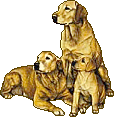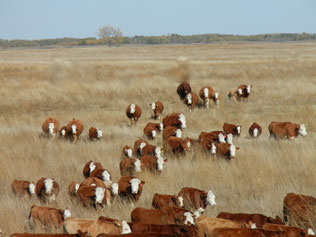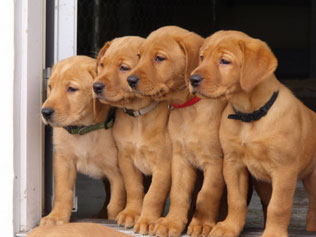LAB PUPPY CARE
You and Your Lab
Young pups need lots of cuddling and human contact. Hold them up to your neck under your chin and let them breath in your scent. This helps speed the bonding time. Our puppies are very attuned to humans and NEED lots of human contact...this is part of their nature and is a NEED for them to be happy.
Labs get into destructive behaviors (chewing things up, deliberately going potty in the house, after being fully trained, excessive barking) when they are bored, and unhappy. They need toys that are ok for them to chew on, treats and raw hide chews at all times. They need these things their entire life, but especially in puppy hood.
Most puppies adjust fine, but changing homes and families for puppies can be stressful. This stress and the change in water, can be enough to trigger diarrhea.
Allow your puppy to sleep in the home near a family member for the first 2 weeks (in his kennel/crate). Even if you plan for your lab to reside in the garage, please let it be in the home for the first 2 weeks of adjustment. Puppies feel abandoned and unloved if they are banned to an area alone during the transition and bonding time.
Do not expose him to a lot of people or take him to a lot of places (especially places other dogs frequent, like parks, lakes, etc.) until he has had all of his immunization shots, of which he will have only the first one when you get him. The best place for a young puppy until he is fully immunized is at home.
Until they have had the the full series in them (and until 3 weeks after the last one was given), they can pick up Parvo, and the other diseases that are out there. These diseases could very likely take the life or health of your puppy.
The first 16 weeks of a puppies life is IMPRINTING TIME. Anything that a puppy experiences with strong emotion (fear, happiness, terror, fun, love) he will remember, and be affected by the rest of his life.
If he has a bad experience with noise or is being overworked too young, he may not turn out to be the great hunting lab that he has the potential to become.
Hip Dysplasia can be a double edged sword. The interenet is a great place for additional resources, also your vet can you help with questions that you may have.
The genetic component is only one side and cause of hip dysplasia in labs. Environmental Hip Dyplasia is another... that is probably responsible for more hip dysplasia then genetics. It is important for you to understand there are many factors and causes underlying environmental hip dysplasia...BECAUSE...with the exception of an accident that would damage your labs hips... these are things that you have the power to control.
Labs should never ride in the back of a pickup truck, the jarring can damage the hips, joints, the jumping in and out can bring on hip dysplasia. It does not matter if a dog is in a kennel; it belongs inside the vehicle, no matter what the age.
A puppy falling down a stairs or off a deck, jumping to much, being overworked, running to much and too hard, before the age of 18 months (which is the end of puppy hood - bones, joint and muscles are then fully formed ), can all bring on environmental hip dysplasia in a lab that would have genetically perfect hips and joints . It may show up early in life when the environmental trauma takes place, or it could affect his hips in later life, when the worn joints start up with arthritis and hip dysplasia.
Lack of proper nutrition plays a big part in the development of hip dysplasia. He will need puppy formulated dog food with high levels of protein for the first 18 months.
Feed your 8 week old puppy either one and a half cups of food 2 times a day, or one cup 3 times a day.
Puppies experience growth spurts every now and then, and need more food at those times. Increase the amount you feed (following instructions for amount on the dog food bag for age) and adjust to your individual puppies needs. Some puppies do have bigger appetites and do need more food then others. If you can pinch more than 3/4" to 1" on your puppy’s sides then he/she probably needs more exercise.
Puppies need lots of fresh water available at all times. Puppies bodies are comprised mainly of water, and can dehydrate very easily. Dehydration can do permanent kidney damage, or take the life of your puppy.
Puppies can only be worked, or trained for very short periods of time. Usually 10 minutes is the maximum attention span at first. They are babies.
Kennel train your puppy. This will speed the potty training and keep your lab safe. Never use a kennel for punishment (like time out). That will make him/her learn to hate its crate.
Kennel/Crate train your puppy from day 1. Your puppy needs its own little place within your home, which is his crate. Always carry your puppy out to its potty spot when removing from the crate. Praise lavishly after success. Do not scold for mistakes. Puppies are just like potty training toddlers; .
Dogs learn by repetition, routine, consistency, and praise.
If your puppy is not having success...one of these components are missing from his lessons.
Remember one last thing: I always say “think of your puppy as a toddler”. Common sense tells you, that if you can not keep your eye on him every second, put him in his kennel where you know he is safe.
Enjoy your new addition! Labs have so much to offer us as humans, emotionally, psychologically, and physically.









